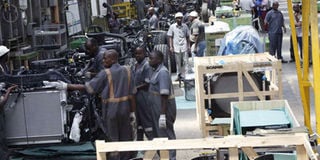‘Big Four’: Lessons from the Asian Tigers

Assembling of vehicles goes on at Associated Vehicle Assembly in Jomvu, Mombasa County, on January 24, 2018. The rise of the Asian Tigers hinged greatly on programmes in areas such as the manufacturing industry. PHOTO | LABAN WALLOGA | NATION MEDIA GROUP
What you need to know:
- The South Korean government provided subsidised mortgages to low-income groups.
- South Korea and Taiwan adopted high-yield seeds and crops and use of fertiliser and modern agricultural equipment and machinery.
The “Asian Tigers” are the highly developed economies of Hong Kong, Singapore, South Korea and Taiwan.
The meteoric rise of these economies has led to overarching comparisons, contrasts and calls for African countries to learn from their experience to achieve meaningful and sustainable growth and development.
The choice of the “Big Four” areas of manufacturing, healthcare, housing and food security by President Uhuru Kenyatta as his legacy projects is viewed by many as a strategy to propel the nation to the double-digit growth envisaged in the Kenya Vision 2030.
The plan’s success will have a great impact on the livelihoods of the majority poor as it will help to solve the endemic problems of poverty, ignorance and disease.
It is expected to bring about 500,000 low-cost houses, affordable universal healthcare, food security and an expanded manufacturing sector.
MANUFACTURING
The rise of the Asian Tigers hinged greatly on programmes in manufacturing, health, agriculture, infrastructure, energy and housing sectors.
As we embark on implementing the “Big Four” plan, one would ask: What lessons can we learn from the Asian Tigers?
First, on manufacturing, the Asian Tigers formulated flexible laws on labour, taxation and environment whose major effect was to expand industrial operations and increase output.
This led to an increase in goods for local and foreign markets.
Those with smaller domestic markets like Taiwan sought free market access for their manufactured goods abroad.
They adopted an outward-oriented strategy and export promotion policies beyond their smaller domestic markets.
HOUSING
With increased industrial output being exported, they could boost their foreign exchange and reduce balance of payments deficits.
That is why Samsung, a South Korean firm, is one of the largest consumer electronics producers.
On housing, government intervention in Singapore provided low-cost housing to most Singaporeans through a two-pronged approach — construction and provision of finished units to land suppliers.
On the contrary, the South Korean government provided subsidised mortgages to low-income groups.
Taiwan offered subsidised low-interest mortgages through a centralised government-run housing fund loaded to the home purchasers at occupation.
The Singaporean model was more successful and impactful.
LAND REFORMS
The success of agriculture, which guarantees sufficient, safe, nutritious food for a healthy and active life, was premised on land reforms, agricultural extension services, good infrastructure and heavy investments in rural areas.
South Korea and Taiwan invested heavily in land reforms.
To ensure more land was put into cultivation, they invested substantially in irrigation and other ancillary rural infrastructure.
They also adopted high-yield seeds and crops and use of fertiliser and modern agricultural equipment and machinery.
Seoul’s sound fiscal policies ensured low taxation on agriculture.
HEALTHCARE
On healthcare, they could guarantee citizens access to affordable key promotive, preventive, curative and rehabilitative healthcare services.
Hong Kong adopted a tax-financed system while South Korea, Taiwan and Singapore went the private sector way.
Even with the huge cultural and environmental gulf between Kenya and the Asian Tigers, which makes each region have unique preconditions for development, there is compelling evidence that we can achieve higher outcomes on the “Big Four” agenda based on the lessons learnt from these miraculous economies.
Mr Ayieko is an economist and commentator on trade and investment. [email protected]. Twitter: BenShawAyieko




